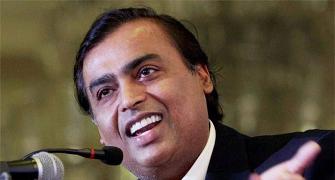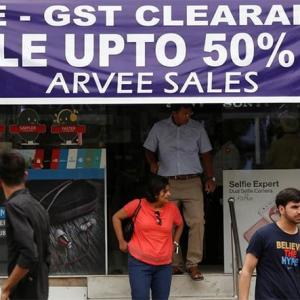Normal monsoon makes FMCG, automobile and consumer durable companies optimistic about growth prospects

In spite of farmers’ agitations in Tamil Nadu, Maharashtra and Madhya Pradesh, companies with a large exposure to the rural markets are getting ready to ride the gravy train because of the forecast of a normal monsoon, the second in a row.
Those in the FMCG, consumer durable, farm input and automobile segments like tractor and two-wheeler have become busy.
Sentiments have turned stronger and they expect a lot of buying in these markets straight away, though the harvest will come to the market only in October to coincide with the festival season.
The share prices of several such companies have begun to climb in anticipation of good sales.
That bumper harvests in crops like onion, tomato and potato, which have caused prices to plummet and thereby fuelled the current farmers’ unrest, has not impacted the sentiment.
Neither does the talk that demonetisation has sucked the trade of liquidity, which is a factor in the recent price crashes.
Rural is a significantly big market for most FMCG companies. Take the case of Kolkata-headquartered Emami.
About 50 per cent of its domestic sales come from rural and the contribution has been steadily increasing.
In FY 17, rural sales grew 12 per cent against 10 per cent growth seen by other channels. Growth in rural has been higher for all the major categories that Emami operates in and the trend is expected to strengthen in the future.
In order to leverage the improved prospects, Emami is strengthening its rural reach through van operations in all critical states.
“This is expected to add over 12,000 towns and villages to our direct coverage. Increased investment on rural activation programmes to drive consumption on is planned. We plan to launch new SKUs and pack sizes targeted at rural areas to get new consumers to growing categories like deodorants,” says Madan Pandey, president (sales), Emami’s consumer care division.
“A better than expected monsoon forecast is likely to boost consumer spends on our categories and accelerate growth for Emami.”
Monsoon bonus
The India Meteorological Department early this month raised its estimate of rainfall to 98 per cent of the long period average against 96 per cent earlier. LPA is the average rainfall received in the 50 years ending 2000, which stands at 89 cm.
While some see a small immediate disruption in the momentum from the switch to GST, the positives from a good monsoon should outweigh the impact.
“The migration to GST notwithstanding, normal monsoon and return of positivity in rural buying sentiment is very encouraging. We are hopeful that the two-wheeler industry will see high single digit or early double digit growth this fiscal,” says Y S Guleria, senior vice-president (sales & marketing), Honda Motorcycle & Scooter India, the country’s second largest two-wheeler player after Hero MotoCorp which gets 28 per cent of its domestic sales from rural buyers.
Honda says it will introduce new products with added value especially to cater to the needs of rural and semi-urban customers this year. “We are also focusing on specific below the line marketing activities like wall wraps, road shows and FM radio campaigns,” Guleria adds.
The two-wheeler industry had seen 7 per cent domestic growth in FY17 in spite of a stronger H1 as demonetisation slowed purchases in H2.
Stocks have started reacting in anticipation of strong rural sales. The share price of Hero MotoCorp, which derives almost half of its sales from rural, hit a new high early this month. It has surged 13 per cent in the last three months.
Other key beneficiaries of a normal monsoon in the automobile industry will be tractors and entry level cars. Domestic tractor sale is poised to hit a new record of over 650,000 units, growing at double digits for the second year in a row.
The industry’s growth phase had started in FY17 after two back-to-back annual declines in volumes owing to sub-normal monsoons.
Sales surged 18 per cent in FY16 to 582,000 units on a low base of 493,000 units in the previous year.
“FY18 should be a record year for domestic tractor sales. The industry is expected to grow at double digits due to good monsoon. We are confident of growing at a rate higher than the industry," says Raman Mittal, executive director, International Tractors, which sells tractors under the Sonalika brand and has a 12 per cent market share.
The stock price of tractor maker Escorts hit a new high of Rs 767 early this month. It has rallied over 13 per cent in a month.
Rural spotlight
Car makers like Maruti Suzuki, Hyundai and Mahindra & Mahindra, which get at least a fourth of their domestic sales from rural markets, also stand to gain from a normal monsoon.
Hyundai, which does not have a nationwide rural footprint in spite of more than 300 rural sales outlets, is exploiting the concept of float vans to market products.
A float van has one display car and it communicates the brand and schemes to the rural buyers. In total, Hyundai has 70 float vans that keep moving in various rural markets.
“We have recently set up a new department to focus on the rural market. We will create a different communication strategy on the products that are well suited for these markets. Every regional office and most dealership now have a rural team. The matrix has been completed,” Rakesh Srivastava, director (sales & marketing), Hyundai, said recently.
Those in the farm inputs business such as fertiliser, pesticides and related products will be the first to benefit from the kharif crop sowing led purchase that picks up pace from July.
“Farm business moves on sentiments,” says S Sankarasubramanian, chief financial officer, Coromandel International, a leading fertiliser and farm solutions company. He says there is “brisk” business activity in anticipation of a good monsoon.
The current turmoil in the villages, these companies expect, will soon give way to optimism.
Photograph: Shailesh Andrade/Reuters










